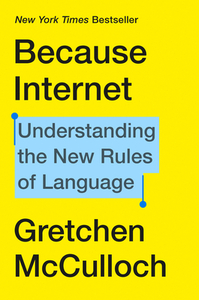Take a photo of a barcode or cover
informative
inspiring
fast-paced
funny
informative
lighthearted
medium-paced
informative
lighthearted
This book started off linguistically fascinating. But by mid-book, topics like “gifs as gestures” became repetitive and then the chapters started losing my attention. All in all, I would rather partake in “laughing out loud” than figuring out why (which this book taught me about myself, so that’s a plus!)
informative
lighthearted
challenging
informative
medium-paced
This is the language book that everyone needs to read. McCulloch's work is rooted in traditional linguistic understanding but oriented towards the now, the future, the possibilities for CONNECTION that the internet gives us. It's academic without losing its approachability, and it's extremely fun to read while taking all perspectives seriously. The chapter on types of "Internet People" alone has shifted (broadened) the way I view the internet and my place in it. Highly recommend!
• • •
"What I've seen from several editors and lexicographers is the realization that we're becoming trapped in a loop: dictionaries and writing manuals refer to edited prose in order to determine what is "standard" English, but the creators of such prose refer back to the same dictionaries and manuals in their editing, each waiting for the other to move first. I've decided to play my part in correcting for this bias by opting for the more innovative direction wherever I perceive a choice: going towards where I think edited English prose will be by the end of the century, catering to the reader of the future rather than the reader of the past . . . To that end, I've chosen to lowercase "internet" and social acronyms like "lol and "omg" and to write "email" rather than "e-mail," and when I've needed to make a decision on other spelling choices, I've looked up which ones are more common in the Corpus of Global Web-Based English and tweets by ordinary people rather than which ones are favored by usage manuals, which has led me to close many compound words."
• • •
"What I've seen from several editors and lexicographers is the realization that we're becoming trapped in a loop: dictionaries and writing manuals refer to edited prose in order to determine what is "standard" English, but the creators of such prose refer back to the same dictionaries and manuals in their editing, each waiting for the other to move first. I've decided to play my part in correcting for this bias by opting for the more innovative direction wherever I perceive a choice: going towards where I think edited English prose will be by the end of the century, catering to the reader of the future rather than the reader of the past . . . To that end, I've chosen to lowercase "internet" and social acronyms like "lol and "omg" and to write "email" rather than "e-mail," and when I've needed to make a decision on other spelling choices, I've looked up which ones are more common in the Corpus of Global Web-Based English and tweets by ordinary people rather than which ones are favored by usage manuals, which has led me to close many compound words."






